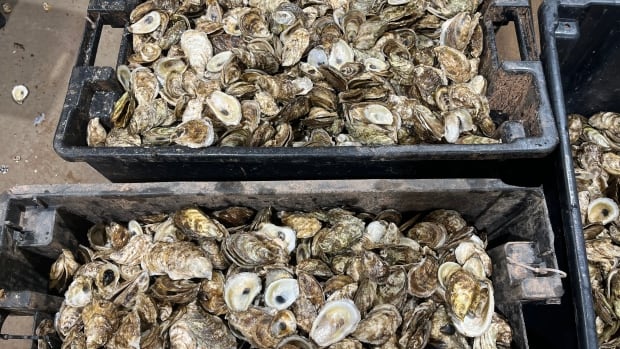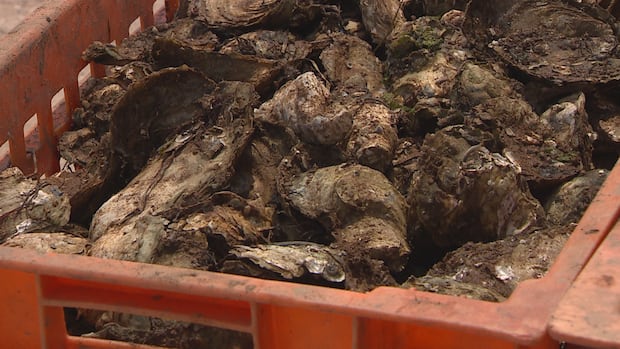
The Canadian Food Inspection Agency says it has placed more P.E.I. sites under quarantine following the discovery of a parasite that affects oysters.
The presence of multinuclear sphere X, or MSX, in Bedeque Bay was confirmed after harvesters noticed in June that some of the oysters were unhealthy or dead. The CFIA was notified and began an investigation to determine if the parasite had spread to other areas.
“Several additional sites have been placed under quarantine as part of our traceout activities,” a spokesperson for the CFIA confirmed in an email late Friday.
A further update posted to the P.E.I. Aquaculture Alliance’s website said that samples from three of 10 sites the CFIA tested were positive for MSX.
More testing required
The alliance emphasized that the results are presumed but not confirmed to be positive and will require further genetic testing.
“All leases that were linked to the movement of oysters from Bedeque Bay in 2023 and/or 2024 have now been placed in quarantine,” the alliance’s statement says. “Those leaseholders have been contacted by CFIA and given instructions on managing their activities under quarantine. All activities on those [leases] need a permit from CFIA.
“Moving forwards CFIA, in partnership with other Federal and Provincial agencies, will continue to conduct targeted sampling based on movements of oysters from these infected areas. They are also investigating a mortality reported in the Mill River area, on a public bed.”
Neither the CFIA nor the aquaculture alliance would share the locations of the oyster leases, citing privacy concerns.
MSX, a parasite that hinders oyster growth and increases mortality among the bivalve molluscs, has been found in P.E.I.’s Bedeque Bay. CBC’s Wayne Thibodeau spoke to Thomas Burleigh, the general manager of Burleigh Brothers Seafood Ltd., and Bob MacLeod, president of the P.E.I. Shellfish Association, about the impact this discovery could have on the Island’s industry.
The CFIA said it continues to work with Fisheries and Oceans Canada and the province to establish a zone in Bedeque Bay that “will provide the necessary controls and permitting for movement of products outside of the area to enable the industry to function, while still protecting oyster populations outside of the affected area.”
MSX doesn’t pose a threat to humans, so the affected oysters are still safe to eat. But the parasite can slow the growth of oysters and kill some of them.
Help may be needed for industry
The new presumptive positive results are not the news P.E.I.’s multimillion-dollar oyster industry hoped to hear.
MSX wiped out oyster stocks in Chesapeake Bay, between Maryland and Delaware, in the 1950s. It had never been spotted north of Maine until 2002 when it was detected in Cape Breton — where it has affected the industry ever since.
Some restaurant owners told CBC News on Friday they’re doing their best to inform diners that the oysters are safe to eat, and that sales don’t appear to have been affected.
But they are concerned about the parasite’s impact on the local oyster supply in the years ahead.
P.E.I. Fisheries Minister Cory Deagle said earlier this week that the province is prepared to provide financial help to the oyster industry if needed.
In an email on Saturday, a spokesperson for the Fisheries Department said the province continues to work with DFO and the CFIA to conduct tests.
“We continue close communication with industry to ensure they have the information they need and help co-ordinate answers to questions they may have for DFO and CFIA,” the statement said.
